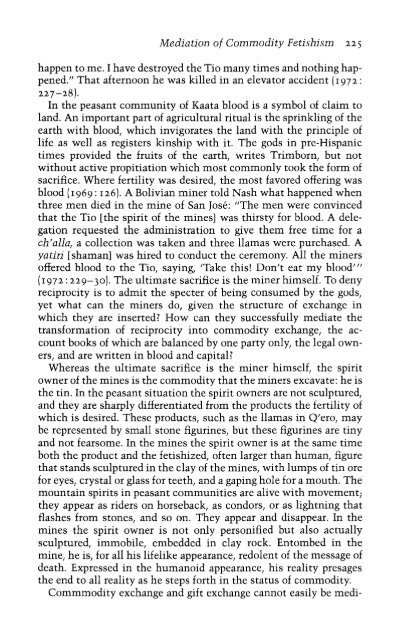The Devil and Commodity Fetishism in South America - autonomous ...
The Devil and Commodity Fetishism in South America - autonomous ...
The Devil and Commodity Fetishism in South America - autonomous ...
You also want an ePaper? Increase the reach of your titles
YUMPU automatically turns print PDFs into web optimized ePapers that Google loves.
IO4 <strong>Devil</strong> <strong>and</strong> <strong>Commodity</strong> <strong>Fetishism</strong> <strong>in</strong> <strong>South</strong> <strong>America</strong><br />
prom<strong>in</strong>ence the salient contrasts of the structures that enclose<br />
them, peasant modes of life <strong>and</strong> proletarian modes, <strong>and</strong> that theirs is<br />
the realm, as Turner puts it, of "pure possibility from whence novel<br />
configurations arise" (Ibid.: 97). <strong>The</strong> creation of the proletarian devil<br />
contract is one such novel configuration. To better underst<strong>and</strong> it, we<br />
need first to sketch <strong>in</strong> the outl<strong>in</strong>es of the local cosmology <strong>and</strong> its<br />
cosmogonic rites.<br />
Cosmology Enacted<br />
<strong>The</strong> popular cosmology of the Cauca Valley derives from<br />
that of the Catholic Church. No matter how odiously the Church is<br />
regarded, its religious impress has been <strong>and</strong> cont<strong>in</strong>ues to be firm.<br />
Preem<strong>in</strong>ent is the Christian myth of creation <strong>and</strong> salvation. This is<br />
constantly reenacted <strong>in</strong> the Church rites of Easter <strong>and</strong> of baptism, as<br />
well as <strong>in</strong> the folk rites of death, folk heal<strong>in</strong>g, <strong>and</strong> sorcery. Indeed,<br />
this fundamental aspect of Catholic cosmogony is repeated for more<br />
people more <strong>in</strong>tensely <strong>in</strong> folk rites than <strong>in</strong> the Church itself. <strong>The</strong><br />
Fall <strong>and</strong> the transcendence of evil as figured <strong>in</strong> the Resurrection can<br />
be said to be the basis of folk rites <strong>and</strong> magic.<br />
<strong>The</strong> official Church vision of the cosmos as trisected <strong>in</strong>to hell,<br />
earth, <strong>and</strong> heaven is greatly modified by the belief <strong>in</strong> the spirits of<br />
ancestors <strong>and</strong> by the very literal belief <strong>in</strong> spirit forces. <strong>The</strong>se ancestor<br />
spirits are known as dnimas or "souls" (almas] or simply as<br />
"spirits" (espiiitus). If unquestionably bad, they exist <strong>in</strong> hell or roam<br />
<strong>in</strong> the air, although the majority <strong>in</strong>habit a special room or part of the<br />
sky. Every person has a spirit, which can desert the body <strong>and</strong> w<strong>and</strong>er,<br />
especially at night. A young friend of m<strong>in</strong>e dr<strong>in</strong>ks water before<br />
sleep<strong>in</strong>g at night so that his spirit will not get thirsty <strong>and</strong> w<strong>and</strong>er.<br />
At death, one's spirit tends to rema<strong>in</strong> close by or to return to the<br />
earthly realm. <strong>The</strong> elaborate funeral rites <strong>and</strong> anniversaries for the<br />
dead are held to purify the spirit <strong>and</strong> to ensure that it achieves <strong>and</strong><br />
reta<strong>in</strong>s its dest<strong>in</strong>y <strong>in</strong> heaven. If, like Julio Arboleda the <strong>in</strong>famous<br />
slave <strong>and</strong> hacienda owner of the early n<strong>in</strong>eteenth century, the dead<br />
person was unremitt<strong>in</strong>gly evil, then his spirit must constantly w<strong>and</strong>er.<br />
He returns especially dur<strong>in</strong>g Easter week when he can be heard<br />
urg<strong>in</strong>g on his mule tra<strong>in</strong> near Villa Rica. <strong>The</strong> dnimas of one's family<br />
tree, particularly one's mother <strong>and</strong> her mother, serve as <strong>in</strong>termediaries<br />
with God, the fount of nature, as people say. When one is <strong>in</strong><br />
danger, one asks the dnimas for help. <strong>The</strong> appeal is made to thwart<br />
danger rather than to ga<strong>in</strong> good fortune. <strong>The</strong> latter request is more
















